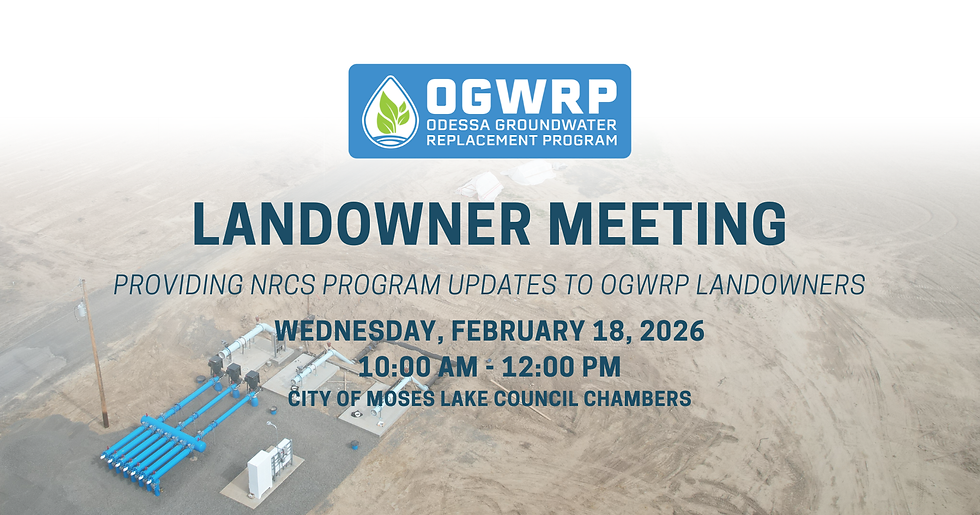OGWRP Field Visit with NRCS Climate Team
- Columbia Basin Conservation District

- Jul 27, 2023
- 3 min read
Natural Resources Conservation Service (NRCS) state, regional and national staff visited OGWRP for a technical review of adding irrigation practices to the Climate-Smart Agriculture and Forestry (CSAF) Mitigation Activities List on July 18, 2023.

Participants on the NRCS Climate-Smart tour of OGWRP.
The visit was prompted by NRCS Chief Terry Cosby last month along with the Columbia Basin Conservation District’s (CBCD) proposal of adding NRCS Conservation Practices Irrigation Pipeline and Pumping Plant to the CSAF Mitigation Activities List. CBCD submitted the technical report to the Washington NRCS office to help NRCS evaluate OGWRP and other similar projects for funding through the Inflation Reduction Act (IRA), which prioritizes projects using practices that have quantifiable carbon sequestration and/or greenhouse gas reduction methodologies.
The field visit started at the EL 47.5 pumping plant with a welcome and overview from Harold Crose, CBCD Resource Conservationist, a tour of the EL 47.5 by Jon Erickson, East Columbia Basin Irrigation District (ECBID) Development Coordinator, and continued to areas within the OGWRP where local producers were able to explain the climate benefits of the project. Thanks to Jake Wollman Jr., Paul Wollman, Michele Kiesz, and Representative Mary Dye, the NRCS Climate Team was shown the importance of irrigation in improving producers’ ability to increase organic matter and that through the implementation of OGWRP, they can improve energy savings by utilizing Columbia Basin Project water rather than using deep, groundwater wells.

Harold Crose, CBCD Resource Conservationist, providing an overview of OGWRP and how the project is in line with climate mitigation and adaptation strategies.
The contingent of the NRCS Climate Team included Gayle Barry, Senior Advisor/National IRA Coordinator; Dana Ashford-Kornburger, National Climate Coordinator; Laura Starr, Regional Soil Health Specialist; Amanda Moore, Director of the West National Technology Support Center; Jon Chilcote, Agricultural Engineer; Roylene Comes At Night, Washington State Conservationist; Larry Johnson, Washington State Conservation Engineer; Bobby Evans, Washington State Resource Conservationist; Kevin Davis, Washington State Agronomist; Laura Williams, Washington State RCPP Coordinator; Austin Shero, Central Area Conservationist; and Jules Riley, Water Resources Planning Specialist.
CBCD’s technical report was developed by Harold Crose and Cari Cortez, CBCD Special Projects Coordinator, to highlight the climate mitigation and adaptation benefits of OGWRP, with irrigation pipeline and pumping plants as the primary practices needed to construct the necessary infrastructure for producers to utilize water from the East Low Canal. After the field visit, the Warden Hutterian Brethren hosted the participants for a technical discussion. Gayle Barry and Roylene Comes At Night led a productive conversation between producers, NRCS, ECBID, and CBCD about how OGWRP can further climate change focused efforts of NRCS programs and what additional data is needed to confirm the carbon sequestration and greenhouse gas emission reduction benefits of implementing OGWRP.

Jake Wollman Jr. and Paul Wollman (OGWRP Producers) discuss the benefits of switching from deep groundwater wells to Columbia River water and how they can better sequester carbon using irrigation.
CBCD is encouraged by the response of NRCS staff at each level and looks forward to continuing collaboration with participants to help show the climate benefits of OGWRP. If additional irrigation practices are added to the CSAF Mitigation Activities List, OGWRP will be eligible for future opportunities using funds from IRA. OGWRP currently has funding through multiple NRCS programs including the Watershed Protection and Flood Prevention Act (PL-566) to develop the OGWRP Watershed Plan and EIS Adoption with ECBID as the project sponsor, and the Regional Conservation Partnership Program (RCPP) for the EL 80.6 and 84.7 on-farm project with CBCD as the lead partner.
The Columbia Basin Conservation District (CBCD) is a consolidation of several conservation districts that have served Grant County and the irrigated portions of Adams County since 1945. CBCD provides technical and financial assistance to help implement voluntary practices that conserve our natural resources. Like other conservation districts across the county, CBCD has a unique and close working relationship with NRCS. Together, they are able to leverage resources and increase on- the-ground conservation.
____
Contact: Kristina Ribellia, CBCD, (509) 765-9618, kristina-ribellia@columbiabasincd.org
_edited.png)




Comments